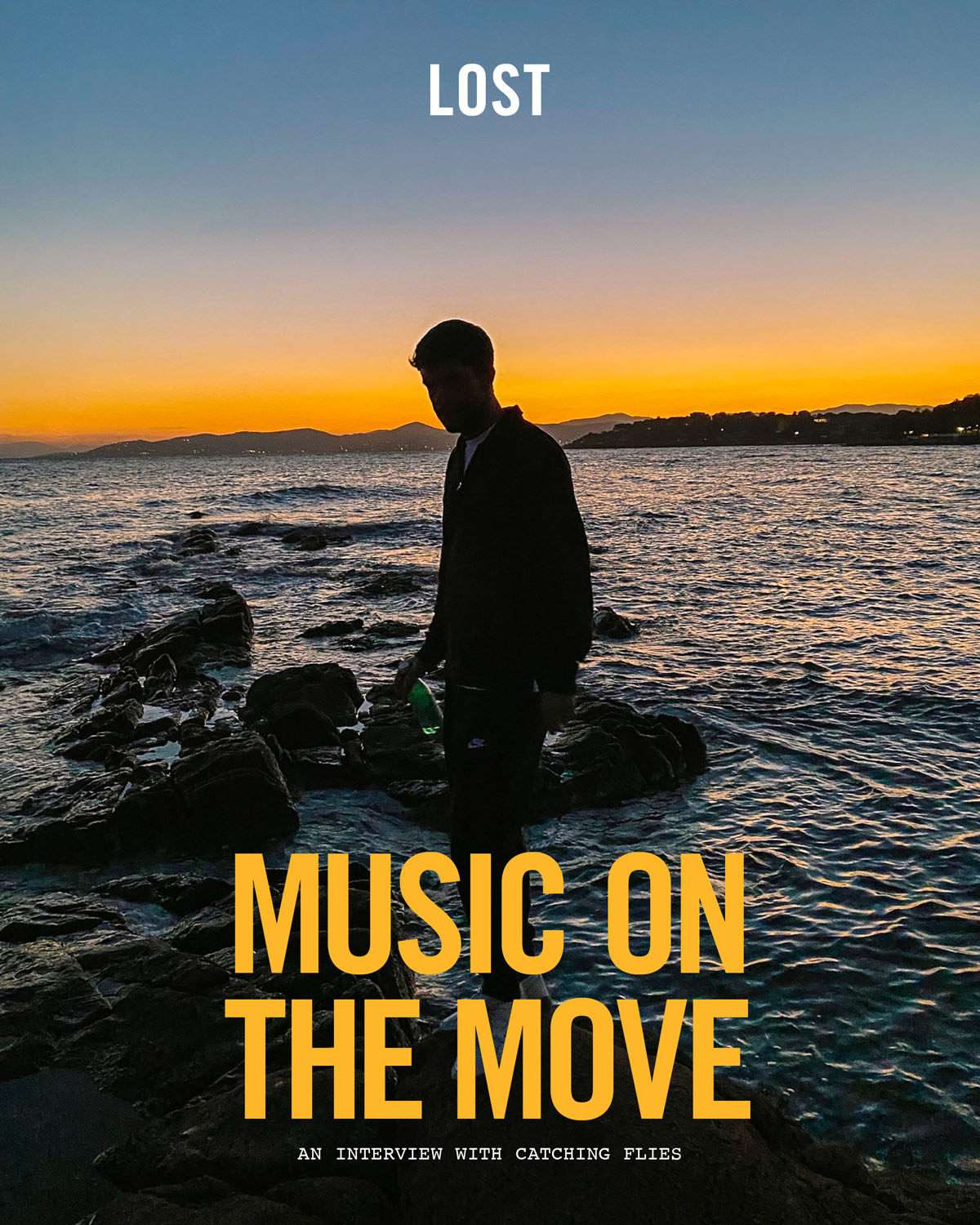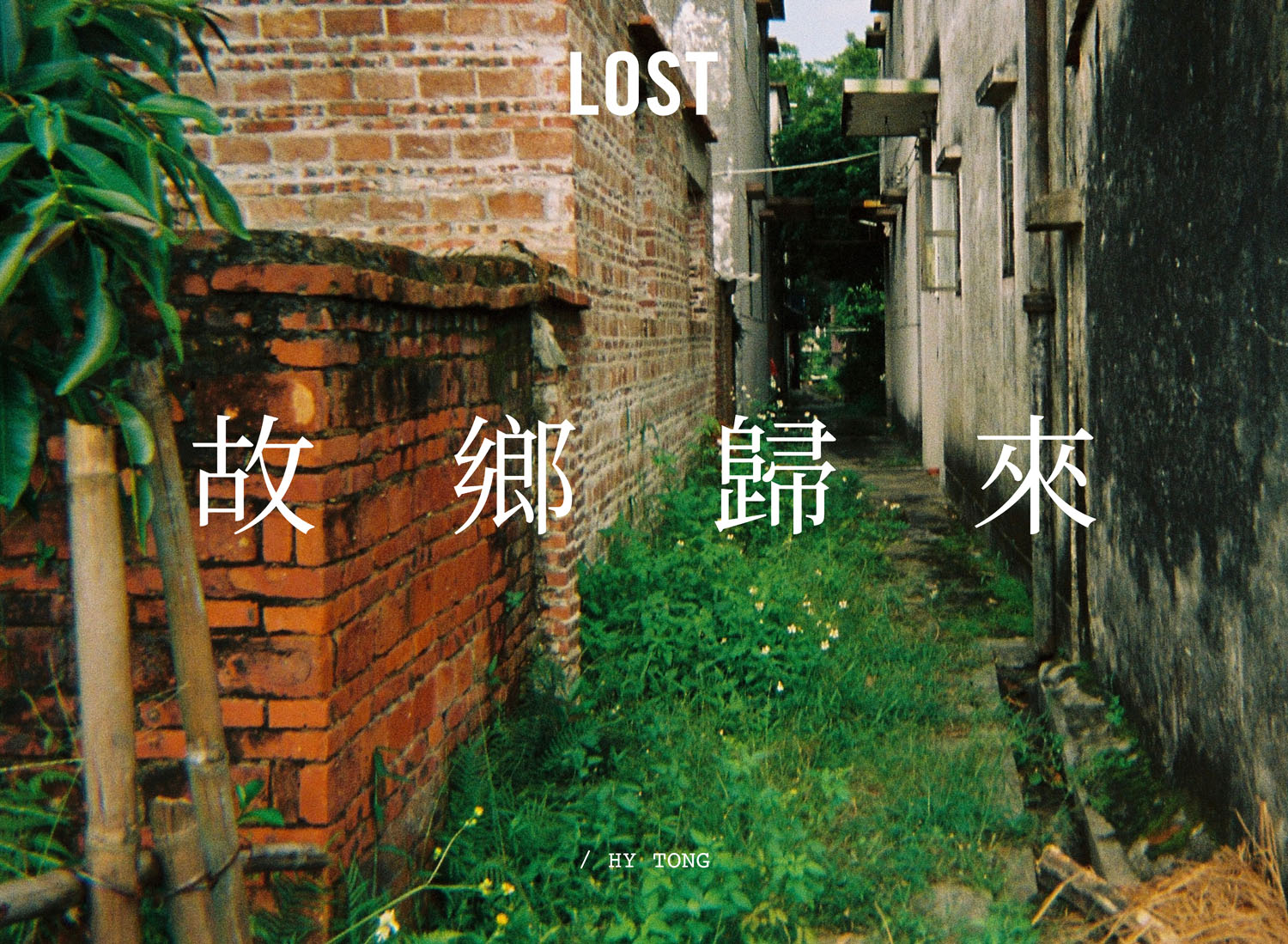BY BIANCA-OLIVIA NITA
That night when the storm broke I was walking back to my room. The narrow shopping street in the Thai border town of Chiang Khan runs parallel to the Mekong, with its food stalls and small clothing shops, restaurants and a few massage parlors in the open. The Mekong, a winding wide ribbon of muddy water, is the natural border between Thailand and Laos. In the daytime, you can look across it into Laos, the shore covered in lush jungle, a land that opens right across the water yet remains covered in mystery. The few Buddha statues sticking out high above the waves of vegetation, the sounds you hear like echoes in the distance, and the towers of smoke coming up from in between the trees are proof that there is human life there too.
It was pitch-dark that night, except for the dim lights along the shopping street. Nightfall in Chiang Khan is like a stage effect that makes Laos disappear completely. It infiltrates the lushness, turning the bright daylight green into a faded shade of brown, absorbing each leaf and branch in silence, until everything is hidden so deep in the darkness, that you are left wondering—until the next sunrise —if that world you thought you saw across the water was truly there. But that night, as the storm took over the world, the lightning would illuminate the sky at intervals if only for a moment, like a light bulb flickering its last breath, and through the stalls and buildings I caught a glimpse of the Mekong and its hidden shore—it was pouring in Laos too.
Travel is a way for me to stop. Stop to look around, stop to observe and feel, and to allow things to be. But as the sky was closing in, this time I couldn’t stop. I walked faster and faster, as fast as my wet flip-flops would allow me. After a while, I found myself all alone, the street completely deserted ahead of me. But I kept speeding through the empty street, until the raindrops got so heavy they turned into a curtain of water that kept my eyes from opening.
Where am I running to? I asked myself. Where do I really have to be? I could hardly see anything now, so on an impulse, I took shelter under a roof covering a narrow strip of ground. It was an improvised little terrace where others had taken shelter long before, four locals about my age and a black dog, none of them in a rush—eating, smoking and gazing idly at the rain. They all stared at me as if a stranger suddenly showed up in their living room. I stared back, the water pouring from the sky behind me, and they all broke into a smile, casually signaling me to come closer and have a seat on the bench.
I patted my wet face with my wet hands. The other people were all completely dry. They haven’t been defying the rain, and as I cuddled in, everyone resumed eating and gazing while this soaked stranger squeezed in between them.
I had almost forgotten how good surrender feels, when no matter what the moment brings, you embrace it, and the only thing you do is watch the curtain of water fall down from the sky and splash in small rivers along the street.
Back home I am always chasing time, but in Thailand, time seems to be kinder. It dissipates into just here—just this moment, just this place; it’s all we have. Am I the only one who has ever wondered how the freedom of a trip could be turned into their daily life? I surely thought of it in some of the best moments of my trips. But now, as none of my hosts were paying attention to me, I sat down and looked around me and thought: What if I got stuck here? What if I couldn’t leave and had to stay, and had to start a new life right now together with these strangers? What walls would I have to tear down to make this life happen? Who would I be?
Language would be a wall between us, one I had struggled to climb during the previous weeks of travelling a less charted route in Northern Thailand’s Isan region, through Udon Thani and Loei and then to here. Chiang Khan is the most touristic of the three, but even here there are almost only Thai tourists, so any attempt to communicate a more sophisticated feeling or desire—other than how many espressos I wanted in one cup or where I wanted to go—proved more difficult than one could have foreseen. I love the new, the unrecognizable. I love navigating new human landscapes, discovering their logic and new meanings. And even though 7-Eleven became our most trusted stop throughout this journey, it’s still the search in unfamiliar places that I remember most from these past few weeks. Although people are friendly and always willing to help, I learned that when there is a lack of words, life is still possible—yet always from an invisible distance, removed from the true complexities of life, only scratching the surface of what living in this country is truly like.
I’m not new to Thailand. I have so many visas in my passport from previous years entering the country that I’d expect at one point to be asked why I am here so often. The answer is that I have a love for scratching the surface to understand this place, and I have love for its people, the jungle and the Mekong. And I am here, because over here I can stop chasing time and be who I am in this anonymity.
I love the north especially. In all my travels here, I never went south of Bangkok, always north. Each time I return home, I long for the smell of spices and fermented fruit, the tormenting heat of middays, the illusory taste of taking part in this life and a feeling of this country’s past which I’ve read about but never witnessed. I look around, sewing together the pieces from my knowledge, longing to understand the present through the lens of what I know and feel. And even though my books explain the social norms and the complicated history and beliefs that have shaped these places, I am most likely chasing ghosts. Without the language, there’s only so much I can truly grasp and see.
But I keep coming back to the Mekong. The night before the storm, I joined the Thais who gathered to watch the sun setting over it, the calmness and beauty of the view leaving us all speechless. The Mekong carries a mystery—part of it because it crosses the entire South-East Asia, and part of it because of its history. I know it’s here, right behind the street. But as the storm floods the world with light from time to time, and with the rain falling incessantly, catching glimpses of it still brought a sense of wonder. It feels like privilege, like something magical is happening to me.
So when does someone cross the invisible layer of the outside, in order to belong? How many times should I return before this place truly becomes home? What if I stayed?
No matter what I do, I carry a tag with me that I feel but cannot see. I am a farang, a westerner, and to be honest, that is not a tough thing to be. My tag opens doors and smiles, and it allows me to do as I please. I can be clumsy and lost, and occasionally weird, all under everyone’s permissive eyes. No one expects anything from me, and freed from the burden of expectations, I can find a version of myself I need here. Yet can I truly be myself? I have no name here; I am fully noticeable yet sheltered by a coat of invisibility. I am excused from social expectations, and this very freedom is what keeps me on the outside of the life I long to see.
Yet now, under the same roof, we share this rainy night in silence, stripped of our social selves to be just people taking shelter, and that is the closest thing to a normal life that I can ever have. I am right here and time has stopped. We do not speak but we are one, a group of humans hiding from the rain by the Mekong, with one black dog somewhere in between. And I am happy, soaking wet, but fully present and my heart is here. So I belong, because what does belonging mean other than feeling at ease among peers, right where you need to be? When life comes towards you, we’re just there to witness it, all sheltered and close together, since this never-ending curtain of rainfall is the only thing that we can all see.

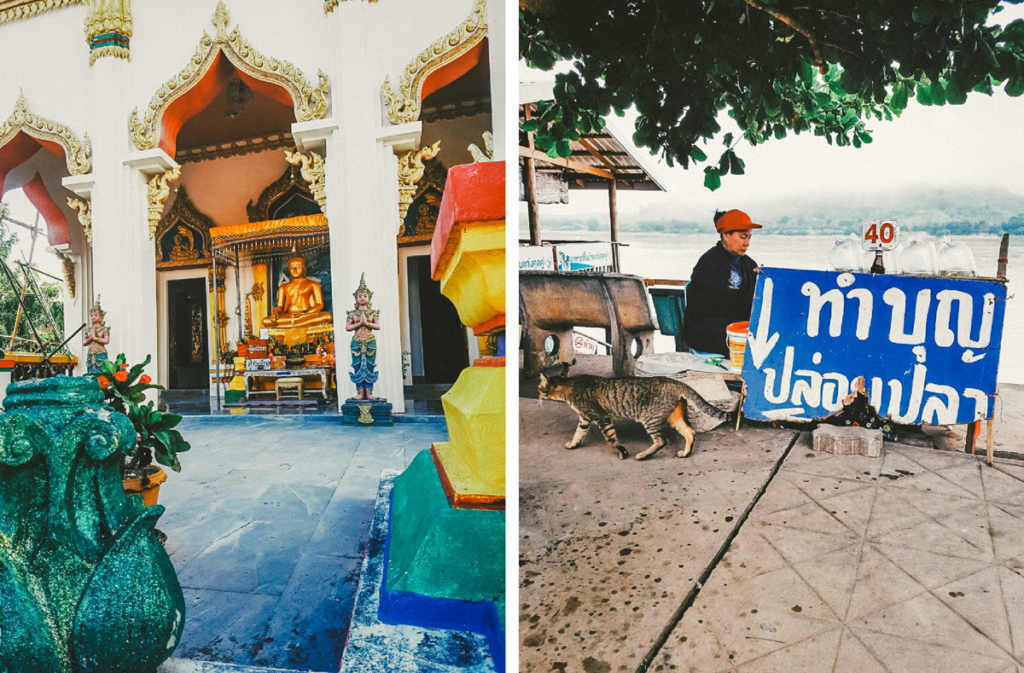
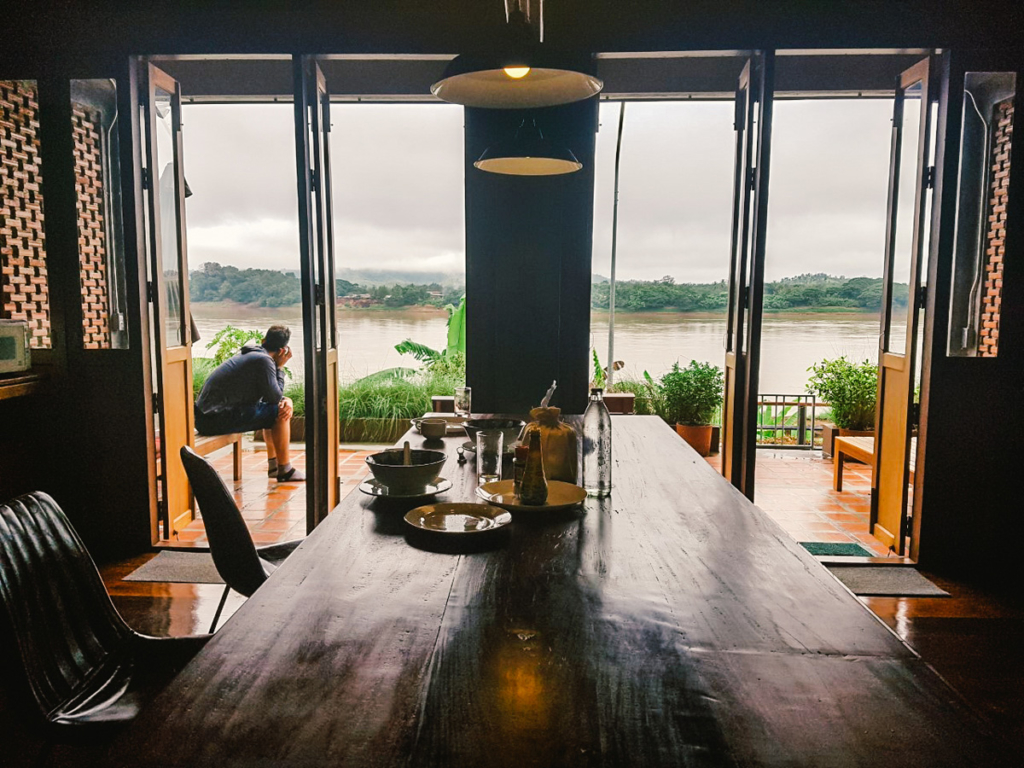



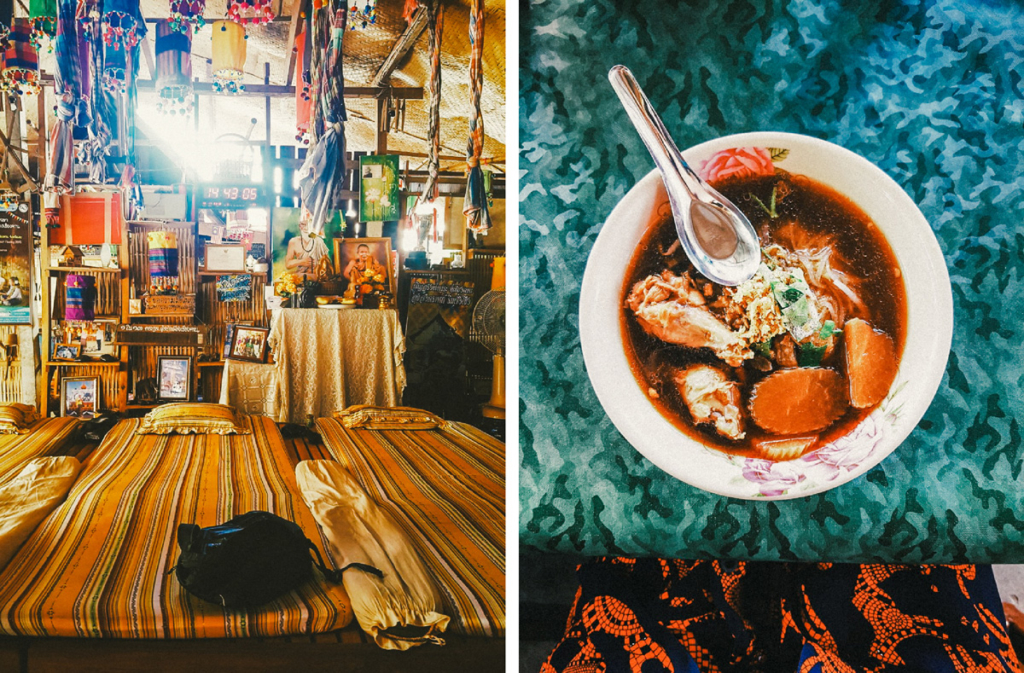
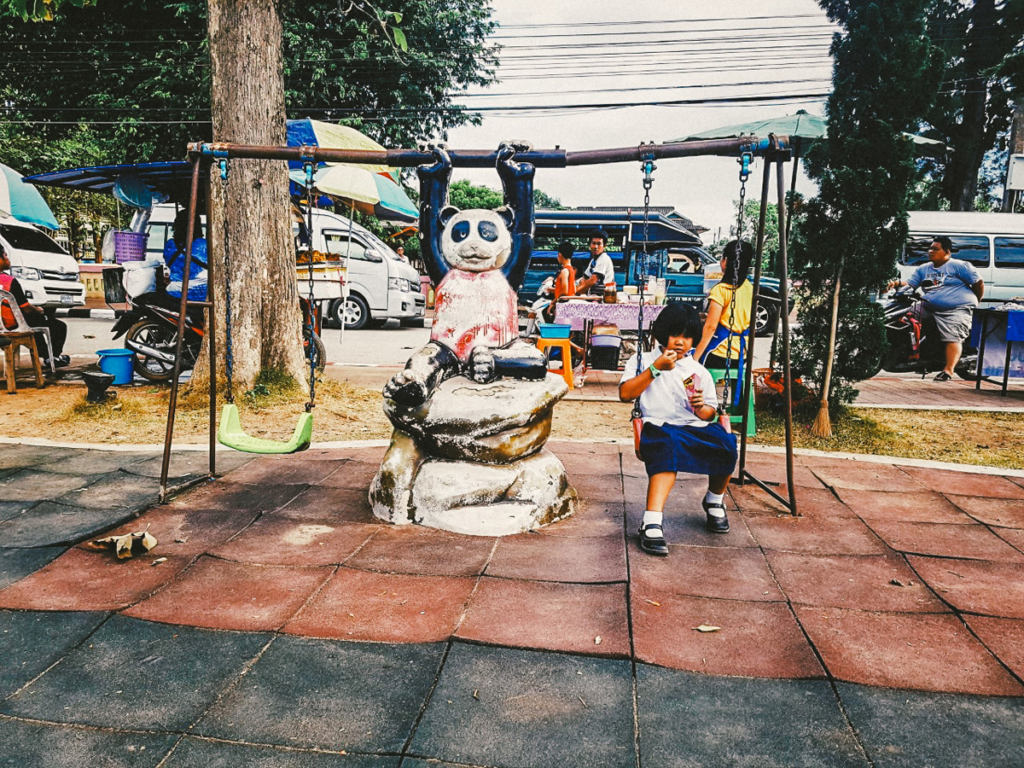

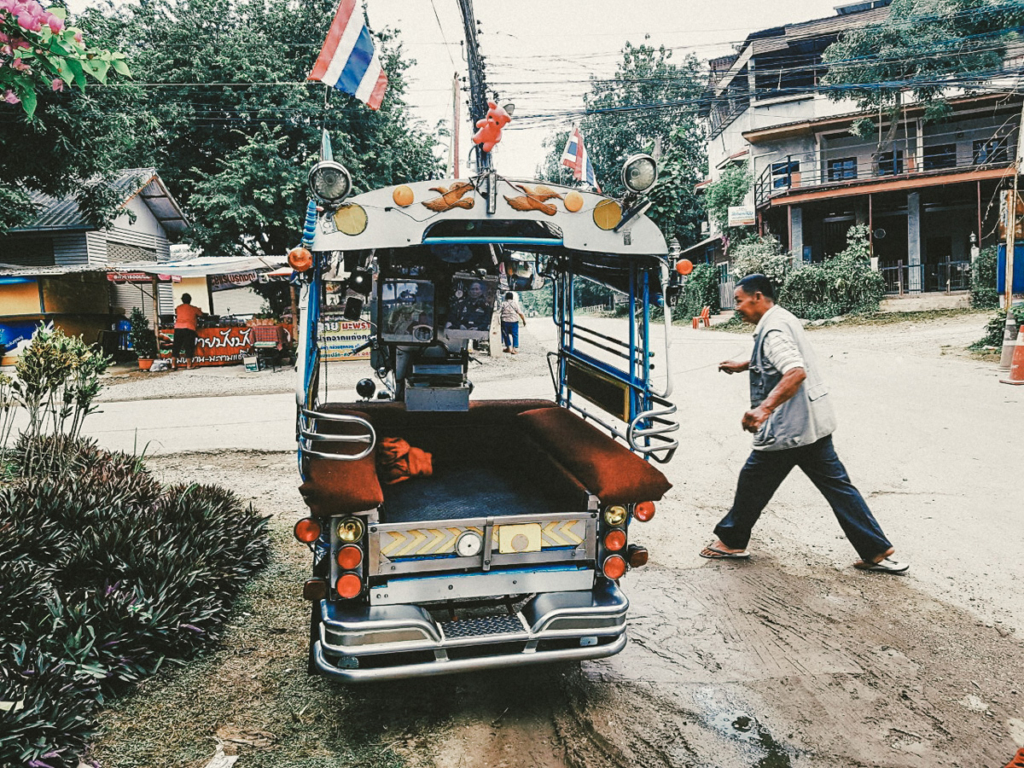
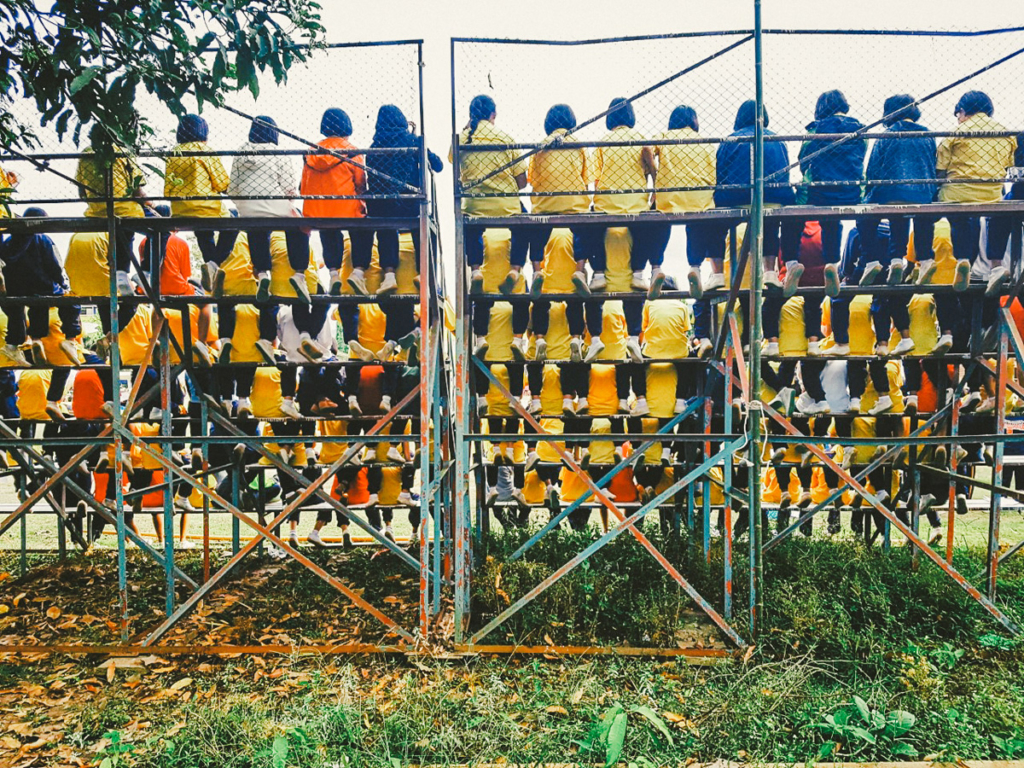

暴風雨來襲的那個夜晚,我正往自己的住處走。在泰國邊境的小城清刊(Chiang Khan),與湄公河平行的狹窄商店街上,有著小吃攤、小服裝店、餐館和一些露天按摩店。湄公河,一條蜿蜒而泥濘的寬闊水域,是泰國和老撾之間的天然邊界。白天,你可以隔河遠眺老撾,河岸被茂密的叢林覆蓋,河水對面的土地一片開闊卻又充滿神秘。幾尊佛像高聳在植被的波濤之上,耳旁聽到的聲音像是遠處的回聲,而樹林中冒出的濃煙證明那裏也有人類棲居。
當天夜裏漆黑一片,除了商店街上一點昏暗的燈光。清刊的日暮如同舞臺特效一般,讓老撾完全消失。它潛入了那片郁郁蔥蔥的植物,白天明亮的綠色變成了褪去的棕色,無聲地吞沒了每片樹葉與每根枝幹,直到所有的事物都藏在深沈的黑暗中,剩你獨自思索至天明——剛才看到的對岸是否真實?但在那天晚上,暴風雨席卷了整個世界,閃電不時照亮天空,就像一只茍延殘喘的燈泡,我可以在攤位和建築物之間瞥見湄公河和它隱蔽的河岸:老撾也下著傾盆大雨。
旅行對我來說是一種停下來的方式。停下來四處看看,停下來觀察和感受,讓一切順其自然地發生。但是,這次我停不下來,隨著天色漸暗,我加快腳步,穿著濕滑的拖鞋,能走多快就走多快。過了一會兒,我發現自己落單了,眼前的街道寂靜無人。我在空蕩蕩的街道上繼續加速前進,直到雨點越來越密,變成水簾,而我再也無法睜開眼睛。
要往哪跑?我問自己。哪裏才是我真的必須要去的地方?眼下我幾乎什麽也看不見,一念之間,我躲到了一片狹窄的屋檐下,早有人在這個臨時的小平臺躲雨了,四個與我年齡相仿的當地人,還有一只黑狗,他們一點都不著急——吃東西、吸煙,百無聊賴地望著雨水。他們齊刷刷地盯著我看,好像看一個突然出現在自家客廳裏的陌生人。於是我也回望他們,在我身後,雨水從天空傾瀉而下,所有人都笑了,隨意地示意我走近,在長凳上找個位置坐下。
我用濕手拍了拍濕的臉。其他人沒有與雨水對抗,全身都是幹的。隨著我擠進來,大家又繼續吃東西、看雨,而我這個被淋濕的陌生人擠在他們中間。
我幾乎忘記了放棄的感覺多美妙,不論此刻發生了什麽,都去擁抱它,那麽你唯一要做的就是看著水幕從天上掉落,濺入沿街的小河。
回到家裏,我總在追趕時間,但在泰國旅行時,時間似乎更寬容。它就這樣消散——就在此時,就在此地,這就是我們所擁有的一切。當然,我不是唯一好奇如何將旅行中的自由帶入日常生活的人。我的確在旅途中最美好的一些時刻想到了這點。但是現在,沒有一個當地人在意我,我坐下來,環顧四周,心想:如果我被困在這裏怎麽辦?如果我不能離開,不得不留下來與這些陌生人一起開始新的生活怎麽辦?我要戰勝怎樣的困難才能實現這種生活?我會變成怎樣的人?
語言將是我們之間的一堵墻,一堵在過去的幾周裏我一直努力攀登的墻。在泰國北部的依善(Isan)地區,我選擇了一條鮮有記錄的旅行路線,途徑烏冬他尼(Udon Thani)和黎府(Loei),然後來到這裏。清刊是這三個地區中遊客最多的地方,但即使在這裏,也幾乎只有泰國本地遊客。因此,任何關於更復雜的感覺或欲望的溝通都遠比預想得更困難——除了想要幾份意式濃縮咖啡和想去的地方之外。我喜歡新的、尚未被發現的事物。我喜歡遊覽新的人文景觀,探索它們的邏輯和新的含義。即使7-11成為了整個旅程中最受我們信任的休息站,這次對陌生領域的搜尋仍然是過去幾周中最令我記憶深刻的事。即使人們友善且樂於助人,讓我相信在言語不通的環境下生活的可能性,但由於脫離了真實生活中的復雜性,好像總有一段看不見的距離,我只摸到了在這個國家生活的真相的皮毛。
泰國於我並不陌生。過去幾年來,我的護照上有很多泰國簽證,我甚至期待在某刻會有人問我為什麽如此頻繁地造訪泰國。答案是,我喜歡從零開始理解這個地方,我也熱愛它的人民、叢林和湄公河。我來到泰國,因為在這裏我可以停止追逐時間,可以借這裏的匿名性成為我自己。
我尤其喜歡北方。我從未去過曼谷以南的泰國,總是向北。每次回家後,我都渴望香料和發酵水果的氣味,正午的酷熱,融入當地生活的幻覺,以及我讀過但從未見過的這個國家的過去。我四處尋找,將自己的知識拼湊在一起,期盼能通過自己的知識和感受來理解這個當下。雖然書籍解釋了這個國家的社會規範,以及塑造這些地方的復雜歷史和信仰,但很可能我只是在做無用功。因為語言不通,我能真正掌握和看到的東西少得可憐。
然而我卻一再地回到湄公河。暴風雨前的夜晚,我加入了一群聚在一起看日落的泰國人,平靜而美麗的景色令所有人失語。湄公河的神秘性一部分在於它穿過了整個東南亞,另一部分來自於對其全部歷史的了解。我知道它在這裏,就在這條街的後面。但夾雜著閃電的暴風雨淹沒整個世界,雨水不斷地降落,驚鴻一瞥中看見湄公河,就好像一種特權,好像有神奇的事情發生在自己身上。
所以,一個人何時才能跨越不可見的外殼,歸屬於此呢?我要回到泰國多少次,這裏才能真正成為我的家?如果我留下會怎樣?
無論我做什麽,都帶著一個看不見但卻能感覺到的標簽。我是一名 farang,是西方人,老實說,這不是什麽大麻煩。這個標簽為我打開了大門,帶來了微笑,讓我可以隨心所欲。我可以笨拙、迷路,甚至有時舉止怪異,所有人都不會介意。沒有人對我有所期待,因此沒有負擔,在這裏,我可以找到我需要的那個自己。但是,我真的可以做自己嗎?在這裏,我是無名氏;我引人註目,同時又躲在隱身衣之下。我無需滿足社會期望,而正是這種自由讓我無法得到自己想要的生活。
然而,此刻,在屋檐下,我們在寂靜中共享這個雨夜,擺脫了社會自我,只是躲雨的人,這是我最接近普通生活的時候。我就在這裏,時間已經停止了。我們不說話,但我們是一體的,一群人在湄公河邊躲雨,中間夾著一只黑狗。我很高興,濕透了,但完全沈浸在當下,我的心在這裏。所以我歸屬了,因為歸屬感的含義不就是輕松地與同輩相伴嗎?在你需要在的地方,生活朝你而來,而你只是在這裏見證,同被庇護,彼此貼近,好像這永無止時的雨幕就是我們眼中唯一所見。
Bianca-Olivia Nita fell in love with the North Sea, so she left her native Romania for The Netherlands 10 years ago. Her articles, essays and reviews are mainly focused on documentaries, photography, people and places. She is a regular contributor to Feature Shoot and ModernTimes.review, and her writing has appeared in numerous other journals and magazines, such as Guernica, Coldnoon and The Holland Times.
Bianca Olivia 愛上了北海,於是十年前離開故鄉羅馬尼亞,來到荷蘭。她的文章、隨筆和評論主要是關於紀錄片、攝影、人與場所。Bianca 供稿於《Feature Shoot》和《ModernTimes.review》雜誌,她的文章也在很多其他期刊雜誌上出現,比如《Guernica》、《Coldnoon》和《The Holland Times》。


